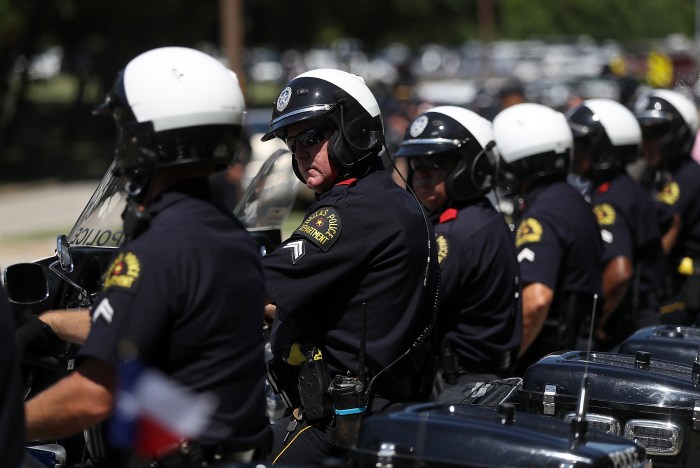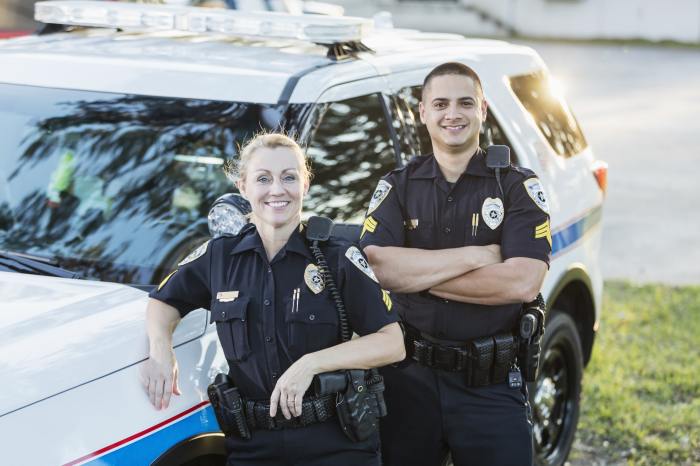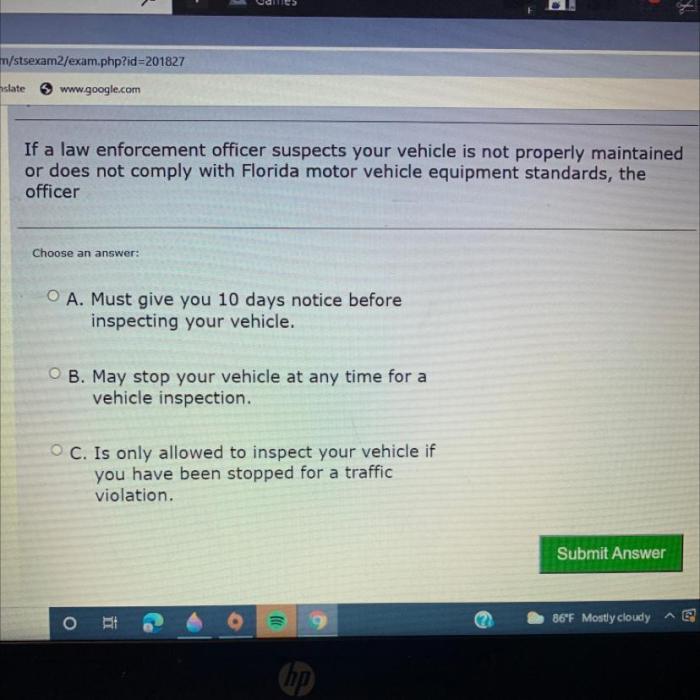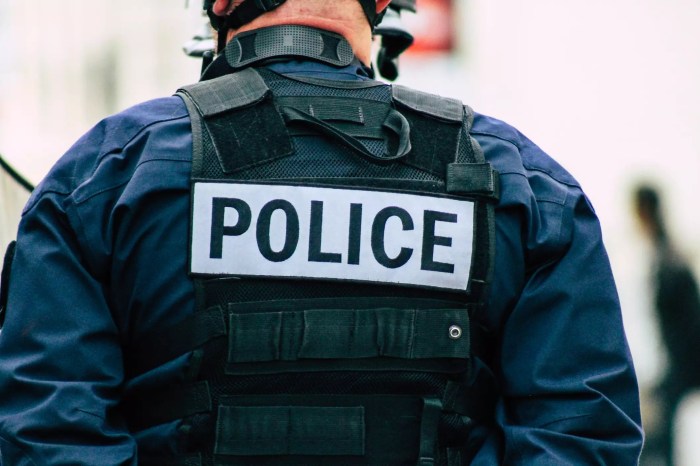If a law enforcement officer suspects that an individual has committed or is about to commit a crime, they have the authority to take certain actions. These actions may include stopping the individual, questioning them, searching them or their property, or arresting them.
However, the officer’s authority to take these actions is not absolute. It is limited by the Fourth Amendment to the U.S. Constitution, which protects against unreasonable searches and seizures.
In order to justify an action under the Fourth Amendment, a law enforcement officer must have reasonable suspicion that the individual has committed or is about to commit a crime. Reasonable suspicion is a lower standard of proof than probable cause, which is required for an arrest.
Reasonable suspicion exists when an officer has specific and articulable facts that, taken together with rational inferences from those facts, would lead a reasonable person to believe that the individual has committed or is about to commit a crime.
Reasonable Suspicion

Reasonable suspicion is a legal standard that authorizes law enforcement officers to briefly detain and question a person whom they reasonably believe has committed, is committing, or is about to commit a crime.
To establish reasonable suspicion, an officer must be able to articulate specific and articulable facts that, taken together with rational inferences from those facts, reasonably warrant the intrusion.
Elements of Reasonable Suspicion
- The officer must have a well-founded suspicion that the person has committed, is committing, or is about to commit a crime.
- The suspicion must be based on specific and articulable facts, not on mere hunch or innuendo.
- The facts must be taken together with rational inferences from those facts.
Examples of Reasonable Suspicion
- An officer sees a person running from a bank with a bag of money.
- An officer sees a person with a gun tucked into their waistband.
- An officer sees a person trying to break into a car.
Search and Seizure

Law enforcement officers possess the authority to search and seize property under specific circumstances. This authority is derived from the Fourth Amendment to the U.S. Constitution, which protects against unreasonable searches and seizures.
Limitations on Search and Seizure Authority
The Fourth Amendment imposes several limitations on the search and seizure authority of law enforcement officers. These limitations include:
- Requirement for a warrant:In most cases, law enforcement officers must obtain a warrant before conducting a search or seizure. A warrant is a court order that authorizes the search or seizure and specifies the place to be searched, the items to be seized, and the person or persons to be arrested.
- Probable cause:To obtain a warrant, law enforcement officers must have probable cause to believe that a crime has been committed and that evidence of the crime will be found at the place to be searched.
- Reasonableness:Searches and seizures must be reasonable. This means that the scope of the search or seizure must be limited to what is necessary to investigate the crime and that the search or seizure must not be excessive.
Valid and Invalid Searches and Seizures
Whether a search or seizure is valid depends on whether it meets the requirements of the Fourth Amendment. Some examples of valid searches and seizures include:
- A search of a car with a warrant based on probable cause that the car contains drugs.
- A seizure of a weapon from a person who is suspected of committing a crime.
Some examples of invalid searches and seizures include:
- A warrantless search of a home based on a mere hunch that the home contains evidence of a crime.
- A seizure of property that is not related to the crime being investigated.
Arrest and Detention: If A Law Enforcement Officer Suspects

Law enforcement officers possess the authority to arrest and detain individuals based on reasonable suspicion of criminal activity. An arrest involves the apprehension and custody of a person for a specific crime, while detention refers to the temporary holding of an individual for further investigation or proceedings.
Grounds for Arrest, If a law enforcement officer suspects
The grounds for arrest include:
- Observing the commission of a felony
- Having probable cause to believe a felony has been committed
- Possession of an arrest warrant
Requirements for a Valid Arrest
For an arrest to be valid, the following requirements must be met:
- The arresting officer must have probable cause to believe a crime has been committed.
- The arrest must be made in a reasonable manner.
- The individual must be informed of the charges against them.
Rights of Individuals During Arrest and Detention
Individuals arrested or detained have the following rights:
- The right to remain silent
- The right to an attorney
- The right to a prompt arraignment
- The right to be free from excessive force
Use of Force

Law enforcement officers have the authority to use force when necessary to protect themselves or others, prevent a crime, or apprehend a suspect. The use of force must be reasonable and necessary, and must be proportionate to the threat posed by the suspect.
The principles of reasonable and necessary force are based on the concept of objective reasonableness. This means that the force used must be what a reasonable officer would consider necessary under the circumstances. The courts will consider the following factors when evaluating the reasonableness of an officer’s use of force:
- The severity of the crime
- The threat posed by the suspect
- The officer’s training and experience
- The availability of less-lethal options
Officers may be justified in using force in a variety of situations, including:
- To prevent a suspect from harming themselves or others
- To prevent a suspect from fleeing
- To apprehend a suspect who is resisting arrest
- To protect themselves from harm
The use of force is a serious matter, and officers must be careful to use only the amount of force that is necessary. Excessive force can result in civil liability or criminal charges.
Interaction with the Public

Law enforcement officers play a crucial role in interacting with the public, serving as representatives of the law and protectors of the community. Building trust and maintaining positive relationships with the public are essential for effective policing. By fostering a sense of mutual respect and understanding, officers can create a safe and collaborative environment.
Building Trust
- Transparency and Accountability:Officers should be transparent about their actions and accountable for their decisions, fostering public trust through open communication and ethical conduct.
- Community Outreach:Engaging in community outreach programs, such as neighborhood watch groups and school visits, allows officers to connect with the public on a personal level, building relationships and understanding.
- Cultural Sensitivity:Officers should be sensitive to the diverse cultural backgrounds of the communities they serve, respecting cultural differences and fostering inclusivity.
Effective Communication
Effective communication is vital in interactions with the public. Officers should:
- Active Listening:Pay attention to verbal and non-verbal cues, demonstrating empathy and understanding.
- Clear and Concise Language:Use language that is easily understandable, avoiding jargon and technical terms.
- Respectful Tone:Maintain a professional and respectful tone, even in challenging situations.
De-escalation Techniques
De-escalation techniques aim to reduce tension and prevent conflicts. Officers can employ strategies such as:
- Verbal De-escalation:Using calm and non-confrontational language, officers can help individuals regain control and avoid escalation.
- Non-Verbal De-escalation:Officers can use body language and gestures to convey a non-threatening presence, such as maintaining eye contact and using open hand gestures.
- Negotiation:Officers can engage in negotiation to find mutually acceptable solutions, fostering cooperation and reducing resistance.
FAQ Guide
What is reasonable suspicion?
Reasonable suspicion is a lower standard of proof than probable cause, which is required for an arrest. Reasonable suspicion exists when an officer has specific and articulable facts that, taken together with rational inferences from those facts, would lead a reasonable person to believe that the individual has committed or is about to commit a crime.
What are the elements required to establish reasonable suspicion?
The elements required to establish reasonable suspicion are: 1. The officer must have specific and articulable facts that support their belief that the individual has committed or is about to commit a crime. 2. The officer’s belief must be based on rational inferences from those facts.
What are some examples of situations where an officer may have reasonable suspicion?
Some examples of situations where an officer may have reasonable suspicion include: 1. The officer observes the individual committing a crime. 2. The officer receives a reliable tip from a known informant that the individual is committing a crime. 3. The officer observes the individual fleeing from a crime scene.
